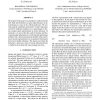Free Online Productivity Tools
i2Speak
i2Symbol
i2OCR
iTex2Img
iWeb2Print
iWeb2Shot
i2Type
iPdf2Split
iPdf2Merge
i2Bopomofo
i2Arabic
i2Style
i2Image
i2PDF
iLatex2Rtf
Sci2ools
101
click to vote
ICIP
2003
IEEE
2003
IEEE
Sparse decompositions in "incoherent" dictionaries
The purpose of this paper is to generalize a result by Donoho, Huo, Elad and Bruckstein on sparse representations of signals/images in a union of two orthonormal bases. We consider general (redundant) dictionaries in finite dimension, and derive sufficient conditions on a signal/image for having a unique sparse representation in such a dictionary. In particular, it is proved that the result of Donoho and Huo, concerning the replacement of a combinatorial optimization problem with a linear programming problem when searching for sparse representations, has an analog for dictionaries that may be highly redundant. The special case where the dictionary is given by a union of several orthonormal bases is studied in more detail and some examples are given.
Combinatorial Optimization Problem | ICIP 2003 | Image Processing | Linear Programming Problem | Sparse Representations | Unique Sparse Representation |
Related Content
| Added | 24 Oct 2009 |
| Updated | 24 Oct 2009 |
| Type | Conference |
| Year | 2003 |
| Where | ICIP |
| Authors | Morten Nielsen, Rémi Gribonval |
Comments (0)

